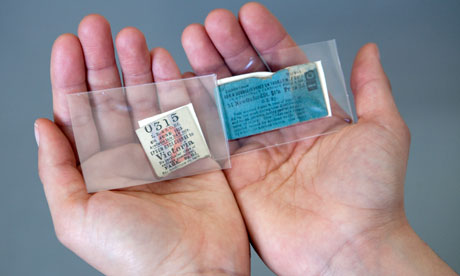
Among the mass of books, magazines, pamphlets, posters and exquisitely stitched banners that pull together the threads of the rich narrative of British women's lives over the past four centuries, perhaps one of the smallest items in the Women's Library is the most intriguing.
The return portion of a train ticket from Victoria station in London to Epsom was among the personal effects found on Emily Wilding Davison, the 41-year-old suffragette martyred under the hooves of George V's horse at the 1913 Derby. It raises the question: did she really intend to die at the Surrey racecourse that day?
"There's something about the strength of that story, the physicality of seeing the ticket and her tiny purse, that makes it so emotional," said the library's collections manager, Teresa Doherty. "It is probably the most popular item here."
The purse and ticket are part of the oldest and most extensive collection of women's history in Europe which, to use the words of the late Mary Stott, founder editor of the Guardian Women's pages, "keeps alive the history of [women's] long march to equality, which is so often forgotten or ignored".
But now the library, for the past 10 years part of the London Metropolitan University and attracting around 30,000 visitors annually, faces drastically reduced opening hours unless a new home, owner, or sponsor can be found by December. The university is seeking to save £1m a year, and without new funding, the library's opening hours will be cut from five days to just one.
For supporters such as Sandi Toksvig, the library's more than 60,000 books and pamphlets, its archive of personal letters, and its 11,000 objects, are the lifeblood coursing through women's history.
"The Women's Library is one of the most inspiring places in Britain. The collection is irreplaceable and having access to it should be a right for all," said the author, presenter and comedian.
Competing for poignancy with Davison's train ticket is the small Women's Social & Political Union hunger strike medal belonging to Elsie Duval, its bars denoting how many times she was in Holloway prison and how many times she went on hunger strike. Duval died in 1919 from heart failure at the age of 27, her supporters believing her health had been compromised through brutal force-feeding while incarcerated.
But the library, first established in 1926 as the Fawcett library, which grew out of Millicent Fawcett's suffrage organisation, encompasses material reflecting far more than the Votes for Women battle.
The 1695 printing of Mary Astell's rare and radical text A Serious Proposal to the Ladies, for the Advancement of Their True and Greatest Interest, calls for formal education for women and sits alongside a prized first edition of Mary Wollstonecraft's 1792 A Vindication of the Rights of Women, donated by the film director and feminist Jill Craigie.
Advice in a Girl's Own Paper weekly of 1884, telling its larger readers to "be thankful that you assimilate and thrive upon your food", nestles near to a 1970s Jackie magazine advising on spots, while a 1973 copy of the socialist-feminist magazine Red Rag proclaims on its cover "Unions, Orgasms and More".
A biography of the Labour politician Barbara Castle is found next to romantic novelist Barbara Cartland's Recipes for Lovers in which she advises an elaborate "all-white" menu for a 10th wedding anniversary meal. Meanwhile Shirley Conran's Superwoman (1975) reminds readers that life is simply too short to stuff a mushroom.
Most of the collection has been donated, not purchased, and Conran has, "as a bookworm and a 70s equal rights campaigner", lodged some of her papers in the library. "The Women's Library records our achievements, how difficult they were and will be," she said.
To the history professor Sally Alexander – a demonstrator at the flour-bombed 1970 Miss World contest – the collection is "a unique part of the renaissance of the feminist, gender and women's history".
Ten years ago, the collection was given a heritage lottery-funded purpose-built building in Aldgate, central London, having been locked awaystored in a dusty vault for much of its long life. There is a lecture hall and space for the 51 colourful early-20th-century protest banners, designed "to float in the wind, to fly in the breeze, to flirt its colours for your pleasure", as Mary Lowndes, leader of the Artists' Suffrage League, put it in 1909. Photographs, rosettes, postcards and cartoons are equally well-preserved.
Today's exhibitions include All Work and Low Pay, with artefacts including worn hammers used by women of the 1910 Cradley Heath chain-makers strike, while Craigie's seminal 1951 documentary To Be a Woman plays continuously. Written comments by recent visitors note there is still a long way to go.
The collection costs around £500,000 a year to run. Malcolm Gillies, the vice-chancellor of London Metropolitan University, said in a statement that the university recognised the library as "an absolutely crucial national and international collection". However, users came mainly from outside, he said, and given "the squeeze on spending everywhere" the university had to prioritise services for its own students. But, he said, the university would "zealously seek a new home, owner or sponsor".
It is in talks to save its other collection under threat, the Trade Union Congress library, and hopes to do the same with the Women's Library.
An e-petition to Michael Gove, the education secretary, has already attracted more than 6,500 signatures.
Toksvig said: "It truly is a national treasure, and should be maintained at all costs."

